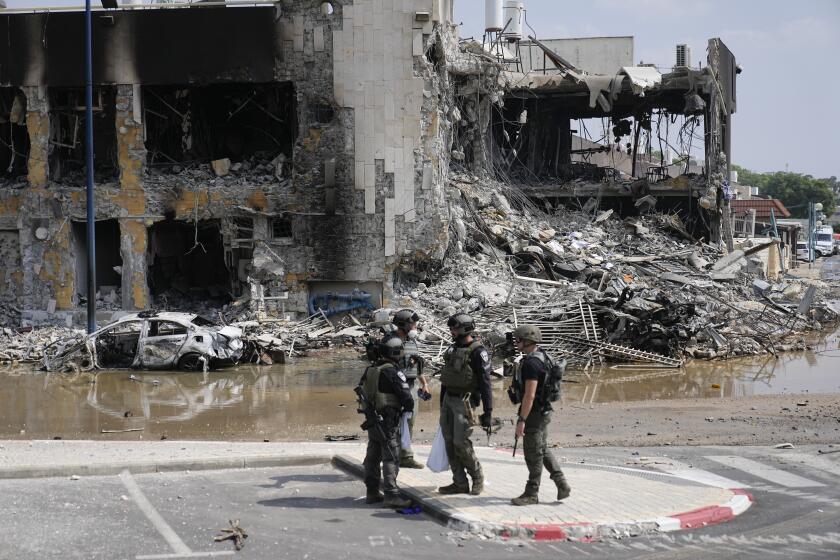Column: Who’s to blame for the Hamas attack on Israel? That debate is already going off the rails

Within hours of the slaughter in Israel, the question of Israel’s “massive intelligence failure” — as many have called it — came to dominate a lot of the media coverage and conversation.
On one level, this is entirely defensible. Israeli officials acknowledge the obvious fact that it was, with the arguable exception of the surprise invasion that launched the Yom Kippur War, the worst intelligence breakdown in Israeli history. Israeli citizens are talking about it openly, including those I’ve spoken with.
For the record:
6:12 p.m. Oct. 9, 2023An earlier version of this column mentioned rape in the attacks, but such reports have not been substantiated.
Israel battled Hamas infiltrators for a third day and massed tens of thousands of troops near the Gaza Strip after the biggest attack in decades on Israeli soil.
But there is something about the way some people talk about Israel’s inability to detect or prevent these attacks that is deeply troubling and speaks to the moment we’re in. It resides in the gray area between “they should have known” and “it serves them right.”
In other words, talking about intelligence failures can be a way of blaming Israel: Of course Hamas wants to send monsters to slaughter parents in front of their children, assault women, abduct grandparents and parade them as trophies. It’s the geopolitical equivalent of figuratively (and possibly literally) blaming rape victims for not being careful enough.
For the intelligence-failure obsessives, writes John Podhoretz, the editor of the Jewish American journal Commentary, it’s “as though Israel somehow summoned this evil upon itself and therefore what we should talk about is what Israel did wrong.”
One path is vengeance. The other path, which requires bolder leadership, requires shattering the old paradigm of eternal enmity.
Again, Israel’s leaders did fail here and there is no doubt that Israeli politics, and Israeli society, will be grappling with that fact for decades to come.
But what about the other side of the equation? The assumption that Israel must always be on guard against this sort of organized barbarity suggests that the barbarians have no agency. This is just what “they” do. They are like bad weather or wild animals, so it is pointless to get angry or assign blame. Can’t blame them for being what they are.
This dehumanizing refusal to accept the role of human agency and pure moral choice is a common affliction. We see it on full display in the debates over Russia’s invasion of Ukraine. Of course, Russia did this, the realists and apologists argued. Ukraine is their “sphere of influence,” part of the historic Russian empire. Ukraine or NATO “provoked” Russia, insist an ideologically diverse coalition of victim-blamers. The idea that Putin had no choice but to launch an illegal and barbaric invasion of Ukraine is a perverted form of Western arrogance and myopia. Putin had a choice and he made it.
Urging restraint won’t work, given the scale of the Palestinian attacks. How far will further escalation go?
Over the weekend, particularly, some anti-anti-Hamas commentators on MSNBC insisted that Hamas’ barbarity is what Israel should expect from its policies in Gaza. This was a “prison break,” according to countless Israel critics. Therefore, voices as diverse as the governments of Iran, Saudi Arabia and Qatar and anti-Israel students of Harvard insist Israel is solely to blame for Hamas’ crimes.
It is fine to criticize various Israeli policies. But this prison break talking point is deeply problematic. If Gaza is a prison, it’s in part because it is run by a prison gang in the form of Hamas, which brutalizes and exploits Palestinian inmates. Also, if the moment inmates escape from a prison they go on a murder and kidnapping spree, many reasonable people might assume the prison exists for good reason. But again, however brutal you might think Israel’s Gaza policy might be, the murderers still chose to murder, the kidnappers chose to kidnap. If you deny them that agency, you’re the one calling them unthinking animals.
The Wall Street Journal reports that Iran helped fund and orchestrate the Hamas attack. The Biden administration is pushing back, claiming there’s no direct evidence of that yet. And, of course, Iran denies it.
The Israeli military said in a statement on Saturday night that it was preparing a coordinated offensive in Gaza using air, ground and naval forces.
But let’s make the tiny leap of the imagination and assume it’s true that Hamas’ Iranian patrons were involved. Iran is not Gaza or a cage of Israel’s design. Israel has not “occupied” Iran. In other words, this was a choice made by human beings. Similarly, Qatar, where the Hamas leader behind these attacks has a comfortable office and ample resources, is not some impoverished Palestinian ghetto. It’s the fifth richest country per capita in the world.
The arrogant solipsism that assumes Israelis, Americans or the West in general has all of the agency and power to work their will — and therefore deserves all the blame when bad things happen — is a form of moral corruption. It is also profoundly dangerous. Such thinking closes avenues of action — diplomatic, economic and military — because it assumes that the bad actors in the world are forces of nature that cannot be deterred or reasoned with, only appeased.
More to Read
A cure for the common opinion
Get thought-provoking perspectives with our weekly newsletter.
You may occasionally receive promotional content from the Los Angeles Times.















